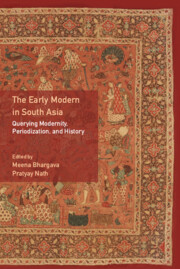8 - The Early Modern Conundrum: Peninsular India and the Idea of Periodization in a ‘Regional’ Perspective
Published online by Cambridge University Press: 06 September 2022
Summary
The idea of the sixteenth through eighteenth centuries comprising the early modern period has gradually and reluctantly acquired a certain currency in historical research. Nonetheless, it continues to remain an uncomfortable and nagging conundrum for ‘medieval’ Indian history, located conventionally between the thirteenth and eighteenth centuries. The condition of the early medieval, located approximately from the sixth to the twelfth centuries, was for a long time met with similar suspicion and uneasiness, though it is now a part of the historical canon. While periodization has cognitively and conceptually structured time in history into the frames of ancient, medieval, and modern, it has also marginalized those areas and themes of historical investigation that do not conform to the categories of analysis comprising these time frames. This is what has given rise to newer categories for studying these marginalized subjects. However, notwithstanding the new challenges and excitement that these subjects have produced in historical research, they have often continued to remain marginal in university curriculum and classroom pedagogy. This chapter argues that the history of South India has conventionally appeared as the ‘regional’ exception within the frame of the medieval in Indian history. To address this, I emphasize the importance of alternate temporal frameworks like the early medieval and early modern to salvage the historical identity of South India and acknowledge its significance in academic research.
This chapter focuses on three issues. First, I discuss the idea of the medieval as a conceptual category and chronological construct in Indian history. Though there have been several writings in the recent past on the category of the medieval and its relevance in history writing, the emphasis here is on pointing out their implications. I argue that the study of the medieval in Indian history, with its association with specific historical processes, is somewhat limited and exclusionary; this has in turn tended to influence pedagogical and research practices in Indian universities. Second, I argue that the chronological categories of the early medieval and the early modern provide frames of analysis that include a wide range of historical processes which till now have remained marginalized within the rubric of the medieval.
- Type
- Chapter
- Information
- The Early Modern in South AsiaQuerying Modernity, Periodization, and History, pp. 161 - 180Publisher: Cambridge University PressPrint publication year: 2023

